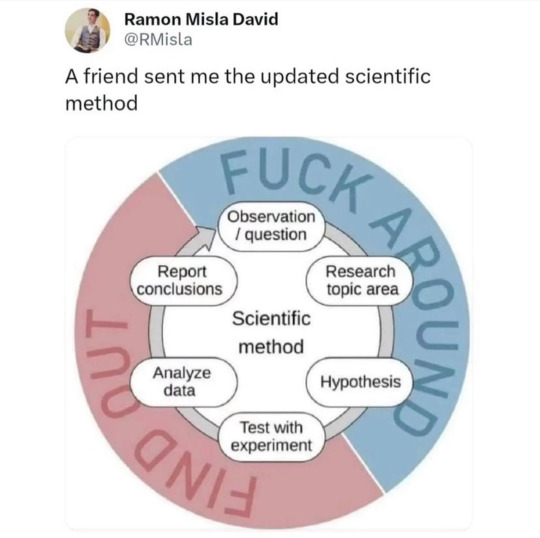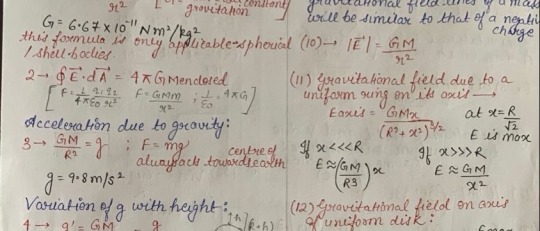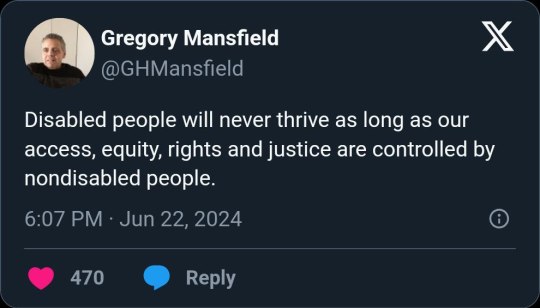#language science
Explore tagged Tumblr posts
Text
look, I know I've talked about this essay (?) before but like,
If you ever needed a good demonstration of the quote "Any sufficiently advanced technology is indistinguishable from magic", have I got an exercise for you.
Somebody made a small article explaining the basics of atomic theory but it's written in Anglish. Anglish is basically a made-up version of English where they remove any elements (words, prefixes, etc) that were originally borrowed from romance languages like french and latin, as well as greek and other foreign loanwords, keeping only those of germanic origin.
What happens is an english which is for the most part intelligible, but since a lot everyday english, and especially the scientific vocabulary, has has heavy latin and greek influence, they have to make up new words from the existing germanic-english vocabulary. For me it kind of reads super viking-ey.
Anyway when you read this article on atomic theory, in Anglish called Uncleftish Beholding, you get this text which kind of reads like a fantasy novel. Like in my mind it feels like it recontextualizes advanced scientific concepts to explain it to a viking audience from ancient times.
Even though you're familiar with the scientific ideas, because it bypasses the normal language we use for these concepts, you get a chance to examine these ideas as if you were a visitor from another civilization - and guess what, it does feel like it's about magic. It has a mythical quality to it, like it feels like a book about magic written during viking times. For me this has the same vibe as reading deep magic lore from a Robert Jordan book.
#off topic#literature#language#linguistics#science#science history#science fiction#fantasy#physics#atomic theory#anglish#chemistry#robert jordan#the wheel of time#uncleftish beholding
43K notes
·
View notes
Text
"There was an exchange on Twitter a while back where someone said, ‘What is artificial intelligence?' And someone else said, 'A poor choice of words in 1954'," he says. "And, you know, they’re right. I think that if we had chosen a different phrase for it, back in the '50s, we might have avoided a lot of the confusion that we're having now." So if he had to invent a term, what would it be? His answer is instant: applied statistics. "It's genuinely amazing that...these sorts of things can be extracted from a statistical analysis of a large body of text," he says. But, in his view, that doesn't make the tools intelligent. Applied statistics is a far more precise descriptor, "but no one wants to use that term, because it's not as sexy".
'The machines we have now are not conscious', Lunch with the FT, Ted Chiang, by Madhumita Murgia, 3 June/4 June 2023
#quote#Ted Chiang#AI#artificial intelligence#technology#ChatGPT#Madhumita Murgia#intelligence#consciousness#sentience#scifi#science fiction#Chiang#statistics#applied statistics#terminology#language#digital#computers
21K notes
·
View notes
Text
Frankly, I don't believe that most of the people who go around giving folks a hard time for, e.g., using the word "dinosaur" in way which implicitly excludes modern birds actually give a shit about taxonomic accuracy; they're just using cladistics as an excuse to indulge in linguistic prescriptivism.
#science#biology#zoology#paleontology#dinosaurs#taxonomy#cladistics#language#linguistics#word nerdery#prescriptivism#grumping#swearing
1K notes
·
View notes
Text
Speaking is one of the actions we do the most every day and most people are very good at it: healthy fluent speakers can easily say 2–3 words per second, selected from tens of thousands of words in our mental dictionary (over 50,000 for adults!). The process of speaking, however, is not as simple in our brains as it seems when we are talking. Take, for example, naming a picture of an apple. Although the word apple comes easily to mind, several processes and brain regions are needed to allow us to fetch the word 'apple' from among all the words we have in memory. Choosing our words is just one of the steps we will describe below with the example of what our brain needs to do in order for us to name a picture of an apple.
Steps involved in choosing our words:
The first step is to think of the concepts associated with the picture of an apple. For example, a few concepts that are related to apples include sweet, crunchy, juicy, etc. These concepts help define what the object we see is; we can define an apple as a fruit that is sweet, crunchy, and juicy.
In the second step, we access all the words1 we associate with the concepts we thought of in step 1. The concepts associated with the picture of an apple can also be associated with words other than apple. Other words beside apple that might activate when we think about the concepts sweet, crunchy, juicy, etc. include pear, plum, or peach (see Figure 1).
The third step is word choice, during which the correct word needs to be selected from among all the activated words. This is what we are interested in researching. The brain needs to process very quickly to choose the right word during speech. Some researchers believe the language system needs help from other areas of the brain to process and choose words so that we can speak fast enough. These proposed areas outside of the language system that help with word choice are believed to support an “external selection mechanismAn external selection mechanism is a mechanism that is not directly a part of the language system but that can help the language system choose the right word when needed.” (in red in Figure 1).
Finally, after we pick a word, we have to say it out loud. To do that, we need the fourth step. During that step, the sounds we have stored in our brain, called phonemesA phoneme is a sound we have stored in the brain. We string each phoneme (sound) together to make a whole word—a lot like spelling using the alphabet! You can think of it like this: the alphabet is for written language and phonemes are for spoken/heard language., need to be activated. We string each phoneme together to make a whole word. It is almost like spelling using the alphabet. You can think of it like this: the alphabet is for written language and phonemes are for spoken/heard language.
apple—spelled with letters
æpәl—spelled using phonemes
And this whole process happens so fast that you never even realize you do all these steps every time you name an object!

Figure 1 - This is what happens in the brain when we name a picture.
First, we look at the picture and think about all the related concepts that help describe the picture. Second, we think about all the other words (lemmas) that can be described by those same concepts. Third, we select a word (lemma), with the help of an external selection mechanism (part of the brain outside of the language system that makes it easier to select words quickly), and use the brain’s knowledge of phonemes to say the word out loud.
Read more in link.
#linguistics#word choice#language#language acquisition#neuroscience#language science#linguaphile#article#science#apple
0 notes
Text

#the real scientific method#scientific method#science side of the internet#science side help me#science side#science side please explain#science side explain#science side of tumblr#mad scientist#memes#dank memes#dankest memes#mental meme#memes are my coping mechanism#memes are my love language#i’m offended by this relatable content#relatable memes#relatable shit#fresh memes
4K notes
·
View notes
Note
I was a bit sad to hear that I'm assumed to be fascist, as a tech worker who has no major issues with slate star codex. But I guess the culture war stuff can wait until after the US has sorted out its constitutional crisis.
If you have no major issues with Scott Alexander Siskind Slate Star Codex, you have no major issues with his ongoing discussion of race science, racial IQ differences and "human biodiversity". This has been known and litigated for years. It keeps cropping up. The most recent example is from January 15, 2025: How To Stop Worrying And Learn To Love Lynn's National IQ Estimates is entirely based on the work of an infamous racial scientist:
Richard Lynn was a scientist who infamously tried to estimate the average IQ of every country. Typical of his results is this paper, which ranged from 60 (Malawi) to 108 (Singapore). People obviously objected to this, and Lynn spent his life embroiled in controversy, with activists constantly trying to get him canceled/fired and his papers retracted/condemned. His opponents pointed out both his personal racist opinions/activities and his somewhat opportunistic methodology.
Those horrible activists. Must've been more "culture war stuff" from woke moralists who don't understand science.
For 50 years, Richard Lynn has been at the forefront of scientific racism. An unapologetic eugenicist, Lynn uses his authority as professor (emeritus) of psychology at the University of Ulster to argue for the genetic inferiority of non-white people. Lynn believes that IQ tests can be used to determine the worth of groups of people, especially racial groups and nations. The wealth and power of nations, according to Lynn, is due to their racial intelligence and “homogeneity” (or “purity”). He argues that the nations with the highest IQs must subjugate or eliminate the lower-IQ groups within their borders in order to preserve their dominance. Since the 1970s, Richard Lynn has been working tirelessly to place race, genes, and IQ at the center of discussions surrounding inequality. [...] Lynn also recycles Nazi-era arguments for Nordic superiority within the “Caucasoid” group, claiming that a “north-south continuum” exists, with people from northern Europe having evolved to be more intelligent than their southern neighbors. [...] Lynn is referring to his belief that racial groups have genetically determined behavioral patterns, and that crime, disruptiveness, and antisocial behavior are part of minorities’ genetic makeup. In this way, Lynn has provided a veneer of scientific respectability to long-discredited racist theories like those popularized by Charles Murray and Richard Herrnstein in The Bell Curve. [...] Lynn is one of the few remaining “race scientists” who is willing to explicitly endorse addressing these supposed problems through eugenic policies. [...] Lynn unabashedly suggests just that, favoring a “parental licensing scheme” in which “couples would have to apply for and obtain a license to have children.” He also believes that there is “a good case for reviving the sterilization of the mentally retarded and criminals,” and has promoted a “commendable scheme” targeting poor mothers which “would require sterilization as a condition of receiving welfare.” (x)
In his own words,
“If the evolutionary process is to bring its benefits, it has to be allowed to operate effectively. This means that incompetent societies have to be allowed to go to the wall… . What is called for here is not genocide, the killing off of the populations of incompetent cultures. But we do need to think realistically in terms of “phasing out” of such peoples. If the world is to evolve more better humans, then obviously someone has to make way for them otherwise we shall all be overcrowded. After all, ninety-eight per cent of the species known to zoologists are extinct. Evolutionary progress means the extinction of the less competent. To think otherwise is mere sentimentality.”
This brief summary is the political project that writing these blog posts advance and reflects who Slate Star is as a person. You have to be profoundly stupid or profoundly racist (but I repeat myself) to think these fascist worldviews don't affect someone's research—indeed, that someone's research isn't a product of, in service of those views—and here I mean both Lynn and Slate Star. To overlook all this and go on favorably citing Lynn is damning. You shouldn't be able to show your face in polite society after this.
Speaking of the political project in question, Lynn funded, and was funded by, neonazis, white supremacists, and hate groups, some violent, throughout his life. He served on the editorial board of Mankind Quarterly, a pseudoscientific racialist journal once described as "written by racists for racists," founded in 1960 by segregationists to advance their cause, and funded by notorious segregationist, anti-semitic, pro-apartheid groups. The people involved in its founding, publication, and articles, including Lynn, were complete pariahs, too racist for what was a racist society—but one that had beaten a blow to nazism and pulled back from those levels of explicit extermination, able to see the link between racial science and the logical teleological end of genocide. The chief founders were Reginald Gates, Henry Garett, G.r. Gayre and Otmar Freiherr von Verschuer. The last was a prominent, famous German-Dutch racial scientist and member of the nazi party, who was not only Mengele's PhD supervisor but who encouraged him to go further with his experiments during the Holocaust; he was able to launder his reputation as a "genetics researcher" postwar, though he was unrepentant. Henry Garett was a lawyer who testified against integration in Brown v Board of Ed. Gates was also a famous scientist fired from Howard University for opposing segregation:

Note the language they (Gates) use to carefully disguise their political goals under a mask of detached, clinical, objective science:

The journal was immediately attacked by legitimate scientists who saw through their obvious machinations. The political goals were evident (x):


Mankind Quarterly never disappeared. It remained closely connected to shadow networks of white supremacist organizations and funding called the Pioneer Foundation, partially a trust for Draper's money. Currently, the journal is published through the Human Diversity Foundation (HFD) by the German white nationalist and AfD social media manager Erik Ahrens and Danish neonazi Emil Kirkegaard, who perhaps plays the most important role in organizing HFD, Mankind Quarterly, Aporia Magazine (another online scientific racism rag), and connecting and bringing to prominence white nationalists, racialists, and hygienists worldwide. Both have defended nazis and the Waffen SS.
Kirkegaard is a named author on more than 40 papers published in the journal Mankind Quarterly, a longstanding outlet for race science theories. The topics of Kirkegaard’s inquiries have included whether black Americans earn less than white Americans because of “average intelligence differences”, comparing penis size, testicle size and “breast-buttock preference” by race, and an attempt to show that in Denmark those with “Muslim names” have lower IQs. The geneticist Adam Rutherford told the Guardian that Mankind Quarterly and similar periodicals were so discredited that it would be “career suicide” for a genuine academic to publish in them. Kirkegaard’s positions appear closer to racism than science. “Africans,” Kirkegaard wrote on his blog in July, “are prone to violence everywhere.” [...] Nonetheless, Kirkegaard enjoys some influential connections. The recordings show him claiming that in 2019 he was among the “online dissidents” that the tech billionaire and rightwing donor Peter Thiel flew to Silicon Valley for discussions. (x)
Kirkegaard is also a pedophile:
In a 2012 blog post, Kirkegaard wrote that it would be a "good idea to legalize child porn" because he thinks viewing this content would reduce the number of rapes committed by pedophiles. He’s also stated that he would support lowering the age of consent to 13 or lower if puberty begins earlier. Despite his own views on child porn and age of consent, Kirkegaard has tried to link homosexuality to pedophilia and categorized all left-wing people as pedophiles on his blog. (x)
We've established how these people operate, how they lie, what rhetorical tricks they pull, what their real goals are, what their history is—the holocaust, apartheid, segregation—and what their political project is—AfD, Trump, Thiel, remigration, eugenics. Going back to Slate Star's blog post:
Thanks to Emil Kirkegaard for the blog post that finally cleared this up for me.
Kirkegaard and Slate Star communicated and collaborated on this. You'll find Kirkegaard in the post comments, along with Steve Sailer, yet another prominent American white supremacist. Kirkegaard retweeted this post when it came out, as did dozens of decrepit, committed, hardcore neonazis and white supremacists. Why are they all cropping up here? Why does he keep talking to them? The answer is clear:
Slate star codex is a white supremacist espousing race science. He is in conversation with other white supremacists, he gets published by them, he cites them. They're his friends, colleagues, patrons because he's a fascist neoreactionary. The people retweeting this stuff are among the most vile, despicable creep freaks raising up the spectre of genocidal racial war, segregation, and apartheid—and they are exactly the ones sponsoring or carrying out the constitutional crisis. Chris Rufo, an unhinged nazi DeSantis ally currently ransacking the Department of Education, is friends with Kirkegaard; he's published in Aporia, cited by SSC. SSC is in league with them, but he keeps a winking distance—look at these ideas, look at these studies, I have so much data—of plausible deniability. Not plausible to me.
This isn't new, either. @vilestviolist kindly provided a link to leaked emails from years ago where SSC revealed he agrees with HBD (human biodiversity, a euphemism for race science) and their conclusions, but just like the original editors of Mankind Quarterly, he knows he couldn't say it openly (then):


He does the exact same thing as the founders of Mankind Quarterly in the exact same way. You can't incorporate ideas from neoreactionaries in your worldview and not wind up one yourself. Don't play coy.
In the post I linked at the beginning, he makes the argument—while citing bunk data—that substandard African IQs, around 60-80, can be improved with development. Ostensibly, the argument is for development. In reality, what he's doing is peddling the idea of racial IQ disparities wrapped in the acceptable idea of development and his blundering, bloviating prose. I am not citing anything further from his rank filth post because race science is a pseudoscience; none of this is legitimate. These people have been completely shunned, banned, and cast aside for decades because the political ends of these nonsensical arguments are patently clear.
This is not "culture war stuff." Saying so deliberately obfuscates and minimizes explicit white supremacy, eugenics, and racial hygenism through a pathetic euphemism. It's the same cloaking mechanism that the original racial scientists used. It doesn't get more explicit than that: this is original, old school, classic fascism. In part or in whole, you're constructing a world that entirely excludes non-white people on the basis of pseudoscientific studies on "human biodiversity" falsely alleging innate, biological differences in intellect and capability. If not, you're engaging and taking in the work of someone who dines with fascists, takes their money, and spreads their views. You're being amoral, context-blind, so open to ideas that you're damaging everyone. This isn't a "discussion," there's no legitimate research here; these ideas have real, tangible consequences. You enjoy reading this drivel while pointing, or being pointed towards white supremacy and debunked racist propaganda. There's no coming back from this. At best, you're a complete dupe. Otherwise, you are a fascist.
#and you always use such sad pathetic language too#i'm just a smol bean who reads fash blogs why attack me :(#zero tolerance for holocaust denial or race science#scott alexander#astral codex#race science
191 notes
·
View notes
Text


Smh im sick of them/lying
#tf2#science party#team fortress 2#art-chi#tf2 medic#engiemedic#engineer x medic#tf2 engineer#medic x engineer#medicengie#bird brains#genetic engineering#german engineering#genetic engineering tf2#german engineering tf2#nothing like having a boyfriend that bites the shit out of you as a love language
280 notes
·
View notes
Text
My favorite thing about science is that it usually says that nothing in our world is specific ,categorysable or simple
And it usually is funny because
"Oh you study Xscience? Can you tell me about X?"
'X doesn't exist.'
Love science
#what is a language? how do you define language?? there is no language.#Fish? nope theres no fish?#Gender?? sex?? no its just random charateristics of individuals that we asigned qualities to by some reason.#and then we also have natural variation that makes it make less sense#i love science#i am currently watching a geologist explain what a rock is#its beautiful#science#linguistics#biology#marine biology#geology#EDIT: maybe i wanst clear enough. i did not mean things dont exist. i think that perfect definitions can't and shouldn't realy be.#You can define anything#but that doesnt mean things outside of taht definition suddenly dont exist. that is whats funny to me#the fact that someone people think everything can be clearly defined . it cant be.#Theres no one definition of fish taht works to my knowledge. but there are still fish swiming in the sea right?
184 notes
·
View notes
Text
Cats have lived alongside humans for around 12,000 years, and during that time, it seems they've been paying close attention to how we communicate. A new study suggests that our feline companions can even learn to associate the words we use for particular objects or images, and they pick this up faster than our own babies do.
Continue Reading.
183 notes
·
View notes
Text
Words for the Universe

kind (late Old English–1600) - Nature in the abstract or viewed collectively.
world (c.1175–) - The material universe; the cosmos; (also rarely) a system of celestial objects. Also figurative. Chiefly with the.
frame (a.1325–) - The universe, the heavens, the earth, or any part of it, regarded as a structure. Now archaic.
creature (c.1384–1611) - The created universe; creation. Obsolete.
university (c.1450–1642) - The whole world; the universe. Obsolete.
engine (?1510–1741) - The universe, or a particular division of it, considered as a working system. Frequently in engine of the world. Obsolete.
universal (1569–1628) - The universe. Obsolete.
universality (1577–1603) - The whole world; the universe. Obsolete.
mass (1587–1697) - The created universe; the earth. Obsolete.
universe (1589–) - All existing matter, space, time, energy, etc., regarded collectively.
all (1598–) - The universe, the macrocosm; the whole of nature or existence.
cosmosie (1600) - Cosmos.
macrocosm (1602–) - The universe (opposed to microcosm); the world of all nature.
existence (1610–) - concrete. All that exists; the aggregate of being.
system (1610–1816) - The whole scheme of created things, the universe. Obsolete.
megacosm (1617–1851) - macrocosm.
cosmos (1650–) - The world or universe as an ordered and harmonious system.
materialism (1817) - concrete. The system of material things; the material universe. Obsolete. rare. world-all (1847–) - The world considered as a unit; the universe.
panarchy (1848–) - A universal realm.
multiverse (1895–) - The universe considered as lacking order or a single ruling and guiding power.
metaverse (1994–) - Meta-universe; cosmology: the hypothetical combination of all co-existing or sequentially existing universes.
SPECIFIC TERMS
static universe (1871–) - A universe which does not move or change.
block universe (1881–) - The universe conceived as resembling an unchanging block.
plenum (1887–) - A space completely filled with matter; spec. the whole of space regarded as being so filled. Contrasted with vacuum.
expanding universe (1931–) - The universe regarded as continually expanding, so that the galaxies are steadily receding from one another.
steady state (1948–) - An unvarying condition in a physical process, especially as in the theory that the universe is eternal and maintained by constant creation of matter.
bubble universe (1982–) - In some inflationary models of cosmology: any of an infinite number of universes formed as expanding regions within a space.
Source ⚜ Writing Resources PDFs ⚜ Word List: Star More: Word Lists ⚜ References ⚜ Historical Thesaurus
#writing reference#writeblr#dark academia#spilled ink#langblr#worldbuilding#literature#science#writers on tumblr#linguistics#writing prompt#science fiction#poets on tumblr#poetry#writing prompts#language#words#sci fi#creative writing#writing inspiration#vincent van gogh#writing resources
137 notes
·
View notes
Text
back to basics


mostly free resources to help you learn the basics that i've gathered for myself so far that i think are cool
everyday
gcfglobal - about the internet, online safety and for kids, life skills like applying for jobs, career planning, resume writing, online learning, today's skills like 3d printing, photoshop, smartphone basics, microsoft office apps, and mac friendly. they have core skills like reading, math, science, language learning - some topics are sparse so hopefully they keep adding things on. great site to start off on learning.
handsonbanking - learn about finances. after highschool, credit, banking, investing, money management, debt, goal setting, loans, cars, small businesses, military, insurance, retirement, etc.
bbc - learning for all ages. primary to adult. arts, history, science, math, reading, english, french, all the way to functional and vocational skills for adults as well, great site!
education.ket - workplace essential skills
general education
mathsgenie - GCSE revision, grade 1-9, math stages 1-14, provides more resources! completely free.
khan academy - pre-k to college, life skills, test prep (sats, mcat, etc), get ready courses, AP, partner courses like NASA, etc. so much more!
aleks - k-12 + higher ed learning program. adapts to each student.
biology4kids - learn biology
cosmos4kids - learn astronomy basics
chem4kids - learn chemistry
physics4kids - learn physics
numbernut - math basics (arithmetic, fractions and decimals, roots and exponents, prealgebra)
education.ket - primary to adult. includes highschool equivalent test prep, the core skills. they have a free resource library and they sell workbooks. they have one on work-life essentials (high demand career sectors + soft skills)
youtube channels
the organic chemistry tutor
khanacademy
crashcourse
tabletclassmath
2minmaths
kevinmathscience
professor leonard
greenemath
mathantics
3blue1brown
literacy
readworks - reading comprehension, build background knowledge, grow your vocabulary, strengthen strategic reading
chompchomp - grammar knowledge
tutors
not the "free resource" part of this post but sometimes we forget we can be tutored especially as an adult. just because we don't have formal education does not mean we can't get 1:1 teaching! please do you research and don't be afraid to try out different tutors. and remember you're not dumb just because someone's teaching style doesn't match up with your learning style.
cambridge coaching - medical school, mba and business, law school, graduate, college academics, high school and college process, middle school and high school admissions
preply - language tutoring. affordable!
revolutionprep - math, science, english, history, computer science (ap, html/css, java, python c++), foreign languages (german, korean, french, italian, spanish, japanese, chinese, esl)
varsity tutors - k-5 subjects, ap, test prep, languages, math, science & engineering, coding, homeschool, college essays, essay editing, etc
chegg - biology, business, engineering/computer science, math, homework help, textbook support, rent and buying books
learn to be - k-12 subjects
for languages
lingq - app. created by steve kaufmann, a polygot (fluent in 20+ languages) an amazing language learning platform that compiles content in 20+ languages like podcasts, graded readers, story times, vlogs, radio, books, the feature to put in your own books! immersion, comprehensible input.
flexiclasses - option to study abroad, resources to learn, mandarin, cantonese, japanese, vietnamese, korean, italian, russian, taiwanese hokkien, shanghainese.
fluentin3months - bootcamp, consultation available, languages: spanish, french, korean, german, chinese, japanese, russian, italian.
fluenz - spanish immersion both online and in person - intensive.
pimsleur - not tutoring** online learning using apps and their method. up to 50 languages, free trial available.
incase time has passed since i last posted this, check on the original post (not the reblogs) to see if i updated link or added new resources. i think i want to add laguage resources at some point too but until then, happy learning!!
#study#education resources#resources#learning#language learning#math#english languages#languages#japanese#mandarin#arabic#italian#computer science#wed design#coding#codeblr#fluency#online learning#learn#digital learning#education#studyinspo#study resources#educate yourselves#self improvement#mathematics#mathblr#resource
700 notes
·
View notes
Text

#ableism#ableist language cw#tw ableist language#fuck ableists#ableist bullshit#science#human rights#ausgov#politas#auspol#tasgov#taspol#australia#fuck neoliberals#neoliberal capitalism#anthony albanese#albanese government#law#morals#ethics#class war#oppression#repression#poverty#homeless#earth#society#humans#humanity#community
269 notes
·
View notes
Text
"bug" is one of my favorite words because it not only has zero scientific basis, but even its colloquial meaning is poorly defined. Are bugs insects? No because spiders are bugs. Do bugs crawl? No because worms are bugs. Is a crayfish a bug? who tf knows
It's clear that the only consistent trait of a bug is that it is smol
486 notes
·
View notes
Text
“When asked to “define the difference between fantasy and science fiction,” I mouth and mumble and always end up talking about the spectrum, that very useful spectrum, along which one thing shades into another. Definitions are for grammar, not literature, I say, and boxes are for bones. But of course fantasy and science fiction are different, just as red and blue are different; they have different frequencies; if you mix them (on paper—I work on paper) you get purple, something else again.”
― Ursula K. Le Guin, The Language of the Night: Essays on Fantasy and Science Fiction
#quote#Ursula K. Le Guin#The Language of the Night: Essays on Fantasy and Science Fiction#The Language of the Night#science fiction#fantasy#writing#from the writer's desk#current reading#current reading quotes#not out of void but out of chaos
150 notes
·
View notes
Text




Panamanian Golden Frog
Atelopus zeteki
These guys are tiny. So small, in fact, that they’re born without eardrums. They use a form of sign language called semaphore to communicate with other frogs. This sign language involves waving hands and raising feet to greet each other, defend territory, or attract a mate. For example, male frogs will wave their arms to attract females, and females will wave back if they are interested.
Unfortunately, they’ve been extinct in the wild since 2007 due to the amphibian chytrid fungus but they’re being bred successfully in captivity.
#panamanian golden frog#atelopus zeteki#frogposting#frog#toad#panama#sign language#amphibians#amphiblr#amphibian#frogblr#toadblr#mine#biology#zoology#marine animals#marine biology#extinct species#animals#science#rainforest#SSP#species survival plan#herpetology#herpetologist
269 notes
·
View notes
